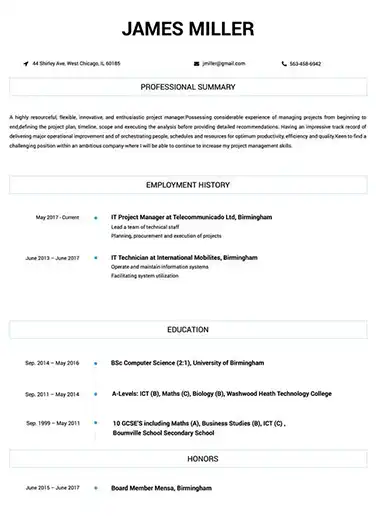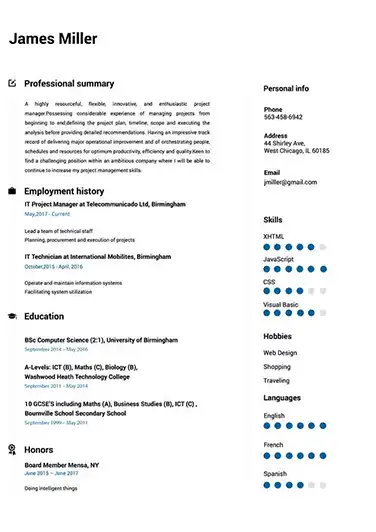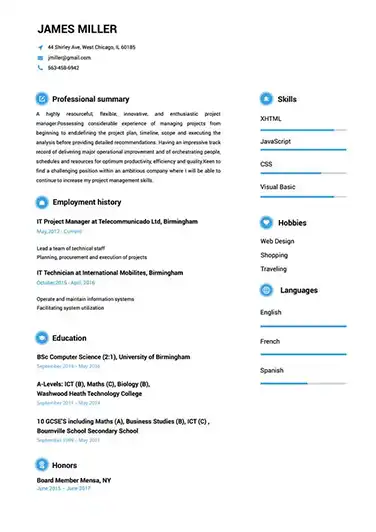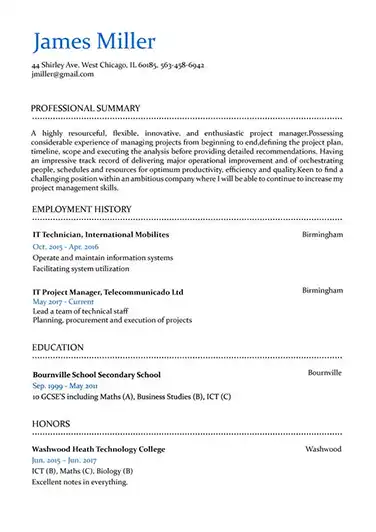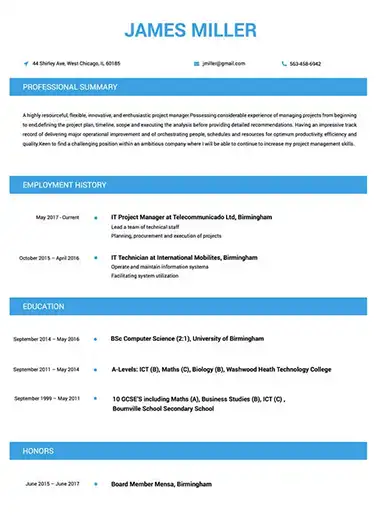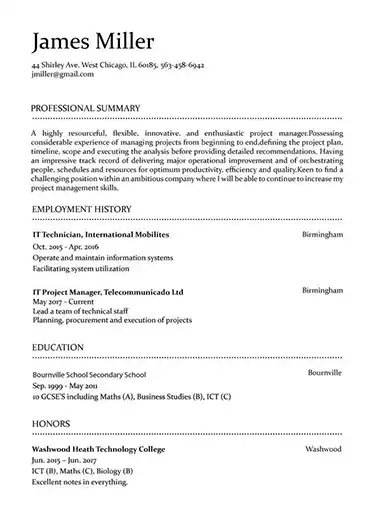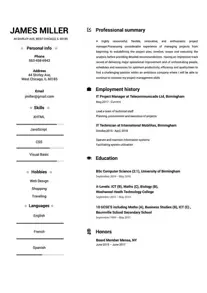 Use This Template
Use This Template
Build your resume in 15 minutes
Create an awesome resume that meets the expectations of potential employers with our selection of professional, field-tested resume templates.
financial analyst: Resume Samples & Writing Guide
davekelly1@outlook.com
988-174-1105
Employment history
- Analyze financial statements for discrepancies and irregularities
- Prepare reports and present findings to senior management
- Develop and document business processes and accounting policies to maintain and strengthen internal controls
- Analyze financial data and create financial models for decision support
- Perform financial forecasting, reporting, and operational metrics tracking
- Identify areas for cost reduction and revenue enhancement
- Develop and document business processes and accounting policies to maintain and strengthen internal controls
- Monitor and analyze industry and economic trends
- Provide financial analyses and advice on capital investments, pricing strategies, and other financial decisions
Education
Skills
Do you already have a resume? Use our PDF converter and edit your resume.
richardsjake@protonmail.com
617-910-5677
Professional Summary
Employment history
- Analyze financial statements for discrepancies and irregularities
- Analyze financial data and create financial models for decision support
- Provide financial analyses and advice on capital investments, pricing strategies, and other financial decisions
- Monitor and analyze industry and economic trends
- Prepare reports and present findings to senior management
- Develop and maintain financial databases
- Develop and maintain financial management tools and dashboards
- Provide support to the accounting department
- Assist in the preparation of regulatory filings
Education
Skills
oliverbailey40@yahoo.com
946-420-1517
Professional Summary
Employment history
- Monitor and analyze performance metrics to identify trends and opportunities for improvement
- Perform financial forecasting, reporting, and operational metrics tracking
- Analyze financial data and create financial models for decision support
- Identify areas for cost reduction and revenue enhancement
- Develop and document business processes and accounting policies to maintain and strengthen internal controls
- Provide support to the accounting department
- Provide support to the accounting department
- Assist with the preparation of budgets and financial forecasts
- Analyze financial statements for discrepancies and irregularities
Education
Skills
jefffoster28@outlook.com
789-384-5730
Professional Summary
Employment history
- Provide support to the accounting department
- Develop and document business processes and accounting policies to maintain and strengthen internal controls
- Assist with the preparation of budgets and financial forecasts
- Monitor and analyze performance metrics to identify trends and opportunities for improvement
- Analyze financial statements for discrepancies and irregularities
- Assist with the preparation of monthly and quarterly financial reports
- Provide support to the accounting department
- Analyze financial data and create financial models for decision support
- Analyze financial statements for discrepancies and irregularities
Education
Skills
irvingadams57@aol.com
758-172-1597
Professional Summary
Employment history
- Identify areas for cost reduction and revenue enhancement
- Perform financial forecasting, reporting, and operational metrics tracking
- Monitor and analyze industry and economic trends
- Monitor and analyze performance metrics to identify trends and opportunities for improvement
- Prepare reports and present findings to senior management
- Provide support to the accounting department
- Develop and document business processes and accounting policies to maintain and strengthen internal controls
- Assist with the preparation of budgets and financial forecasts
- Perform financial forecasting, reporting, and operational metrics tracking
Education
Skills
Not in love with this template? Browse our full library of resume templates
Financial analysts tend to be analytical individuals. After dealing with numbers, spreadsheets, and formulas all day every day, finding the creativity to write a resume can be tough. Combine that with how quickly the financial analyst career field is growing and it’s easy to see just how competitive the job market is.
In a fast-growing field like finance, you need a resume that’s going to stand out. Unfortunately, that’s easier said than done. In this guide, we’ll cover what it takes to create a top-tier financial analyst resume. After reading it, you’ll know:
- How to format your resume
- What recruiters look for in a financial analyst resume
- How to ensure your resume passes through applicant tracking systems
- Which skills you should mention on your resume (and how to list them correctly)
- What to include in the education section of your resume
- How to write a concise and compelling resume objective or summary
- How to reference job postings and edit your resume for each application you submit
- How to make your resume stand out to recruiters
- Top online resume builder tools
Job searching shouldn’t have to be a stressful, time-consuming endeavor. If you follow our resume writing tips, you’ll be on your way to interviewing in no time.
Let’s get started.
Multiple template examples
How to write a financial analyst resume that will get you the job
Resume writing isn’t as intuitive as you might think. Even if you have the experience and skills needed to succeed in a job, that doesn’t always translate into your application. Luckily for you, we know what it takes to impress a recruiter and write an award-winning resume.
How to format it
First things first, you need a properly-formatted resume. Recruiters decide in seconds whether or not they’re going to interview an applicant. If your formatting is off, that’s a telltale sign you aren’t up for the job.
Here are simple, straight-forward rules to follow when formatting your resume.
- Keep your resume to one page in length
- Use one-inch margins on every side
- Divide your resume into the following sections: header, summary, experience, skills, certifications, and education
- Hyperlink contact information so that it’s easily clickable
- List your experience reverse-chronologically
- Use bullet points to emphasis achievements in your experience section
- Use a font that is clean and easy to read
- Use section headers and subheaders to break up text
- Always export as a PDF
These are the very basic resume formatting guidelines every financial analyst should follow. Remember that when it comes to resumes, simplicity is key. You want a resume that is easily readable, with plenty of white space. Trying to cram in as much information as possible almost always does more harm than good.
Instead, keep only the most relevant and important information. A recruiter doesn’t need (or want) to read about things that don’t relate to the job you’re applying to. Conciseness is key. Brevity is your best friend.
What recruiters will look for
When reviewing resumes, there are a few specific things recruiters will look for. Firstly, they want to see that you have the experience needed to succeed.
For almost every position, a bachelor’s degree is required—preferably with a focus in finance or accounting. In addition to education, they’ll look at your past experience. This section is even more important than your education. To show you have what it takes to succeed, you’ll want to highlight your achievements rather than just list your responsibilities.
Secondly, they’ll look to see if you’ve tailored your resume for the specific job posting. And trust us when we say it’s obvious if you haven’t. You can keep a master resume that you use as a starting point for each application, but you should always adjust your summary, experience, and skills section for each job you apply to.
Thirdly, they’ll try to gauge whether or not you’ll be a good fit culturally. This might seem like a difficult thing to convey over a resume, but with a little extra effort, you can. The best place to do this is in your objective or summary section. Focus on how you work with others, the relationships you’ve built with clients, and your professional character.
In order to even get in front of a recruiter’s eyes though, your resume needs to pass through an applicant tracking system (ATS).
How to get your resume past an ATS (Applicant Tracking System)
Applicant tracking systems are used by many large and even medium-sized companies to weed out unqualified candidates. If during the application, you have to submit information through an online system or form, you’re most likely dealing with an ATS.
An ATS uses algorithms to perform an initial screening of all resumes. In doing so, the ATS helps recruiters eliminate candidates that don’t fit the job posting requirements.
Obviously, you don’t want that to happen to you. If it does, there’s virtually no chance a recruiter will even see your resume. In order to ensure your resume passes an ATS, here’s what you need to do.
Include the right keywords
It doesn’t matter how much experience you have or which companies you’ve worked for; if your resume doesn’t include the right keywords, it won’t pass the system. To determine which keywords you need to include, read through the job posting and make a list of which skills and attributes are mentioned multiple times throughout. Be sure to include them wherever you can on your resume.
Just be sure you don’t go overboard. Stuffing your resume with keywords might help it pass the system, but it won’t impress a recruiter. The use of your keywords should feel natural, not forced.
What to include in your resume header
There’s a lot of conflicting information about what needs to be included in your resume header. The good news is, we’re here to clear that up. While it certainly used to be common practice to include your address in your resume header, that’s no longer necessary. It’s outdated and unnecessary.
The days of snail mail are long gone. A simple email and phone number should do. If you want, you can also include your city and/or your LinkedIn profile. Including a link to your LinkedIn profile can be especially useful if you find yourself struggling to keep your resume to a page in length.
Luckily, your LinkedIn doesn’t have any page-length requirements. So even if you don’t have room for everything on your resume, a recruiter can click through and see it all on your LinkedIn.
What skills to mention and how to do it correctly
You obviously need analytical skills to succeed as a financial analyst, but that’s pretty broad. To show exactly what skills you possess, you’ll need to break things down a little further.
Start by making a list of all the skills you have. Don’t reference any job postings, just write down every skill that comes to mind, even if they aren’t necessarily related to your career as a financial analyst.
This will be your Master Skill List and the starting point you use for each job application. Divide your skills into soft skills and technical skills. List them in order of how strong you think they are or how relevant they are to the position you’re applying to.
Now that you’ve created and organized your Master Skill List, you can start cross-referencing them with each job listing. Here are some top sought-after soft skills for financial analysts:
- Accuracy
- Attention to detail
- Multitasking
- Organization
- Presentation and public speaking
- Problem-solving
- Project management
- Prioritization
- Strategic planning
- Time management
- Teamwork
And here are the top hard, technical skills for financial analysts:
- Budgeting
- Cost-benefit analysis
- Data validation techniques
- Data visualization
- Decision-making
- Economics
- Enterprise resource planning (ERP) systems
- Financial forecasting
- Financial modeling
- Financial planning
- Financial software applications
- Mathematics
- Microsoft Excel
- Microsoft Access
- Risk management
- Statistical analysis
- SAP
- SQL
- Trend analysis
If you can, try to weave these into your experience section wherever possible. And remember that soft skills can be better demonstrated with on-the-job examples. Simply stating that you have problem-solving skills doesn’t mean much if you don’t have any examples to back it up.
How to list your education
The education section of your resume should be simple and straightforward. Include your college name, location, and the degree you obtained. There’s no need to mention your graduation year. Employers care that you have the degree, not when you earned it.
If you have the space for it, you can also include any notable achievements, including GPA, honors, student organization positions, and relevant coursework. Keep in mind, though, that these are more relevant for recent grads or financial analysts with only a few years of experience.
If you’ve been in the workforce for more than 5 years, there’s no reason to go into that much detail about your education. That space can be better used in your experience or skills section.
How to write a resume objective and examples of this
If you’re trying to decide between writing a resume objective or a resume summary, here’s a guide to helping you decide. If you have little to no experience, write a resume objective. If you’ve been in the workforce for a few years, write a resume summary.
If you’ve decided that writing a resume objective is the best choice for you, be sure to follow these tips. Write a resume objective that is specific to the job you’re applying to. Go into as much detail as possible about what you hope to achieve. A generic objective doesn’t give a recruiter any useful information.
Wrong resume objective:
Financial analyst with more than 3 years of experience. Skilled in MS Excel, MS Access, and financial forecasting skills. Seeking a new position focused on strategic planning similar to what I did previously at Mizuho.
This resume objective is very meh. There’s not necessarily anything wrong with it, but it definitely isn’t going to catch a recruiter’s eye. It’s average at best.
Right resume objective:
CFA with 3+ years of experience working for Mizuho, a Fortune 500-company in the financial space. I worked closely with our CFO on strategic planning initiatives to increase revenue. Through financial forecasting, MS Access, and MS Excel, I identified low performing portfolios and adjusted as needed, resulting in a 12% increase in revenue.
This objective, on the other hand, goes into much more detail and mentions measurable achievements. A recruiter will be much more likely to call this candidate than the first one.
How to write a resume summary and examples of this
Perhaps a resume summary makes more sense for you. Similar to a resume objective, you want to be as specific as possible in your resume summary.
In a resume summary, the goal is to explain in a few sentences why you’re the best fit for the job. To do this, you’ll want to talk about your most notable achievements as well as what kind of value you can bring to an organization.
Wrong resume summary:
Organized and detail-oriented financial analyst seeking a new full-time opportunity where I can expand my skillset and grow my financial knowledge.
This resume summary isn’t specific at all. Pretty much any financial analyst could use it—which means it won’t stand out. And it certainly doesn’t tell a recruiter anything useful about you.
Right resume summary:
CFA Financial Analyst with 5+ years of experience. Seeking a full-time position where I can leverage my financial forecasting and cost-benefit analysis skills. Saved Miller/Coors $1.3 million through improved pricing and low-margin projects.
This resume summary goes into much more detail about the candidate as well as their past experience. A recruiter can get a sense of their top skillsets as well as the scale of financial planning projects they’ve worked on.
Whichever you end up choosing, a resume objective or a resume summary, remember not to write in first-person. In fact, you don’t need to use any pronouns at all. Just sentence fragments are fine.
How to list certifications on your resume
In some industries, certifications are optional. For financial analysts, they’re not. You absolutely should include a certification section on your resume.
The main certification for financial analysts is the Chartered Financial Analyst (CFA) certification. To obtain it, it takes four years of work experience and a three-part, extensive exam.
That said, if you hold this certification, it needs to be prominently featured on your resume. If you don’t, that’s okay. Here are other certifications worth including on your financial analyst resume:
- Chartered Financial Analyst
- Certified Financial Planner
- Chartered Financial Consultant
- Certified Public Accountant
- Certified Fund Specialist
- Certified Investment Management Analyst
- Chartered Investment Counselor
- Personal Financial Specialist
It’s also helpful to add any major certifications you hold in the header of your resume. For example, “Samuel Jones, CFA” sounds much more credible than just “Samuel Jones”. It’ll also ensure a recruiter knows right away that you’re certified.
How to list any additional details, like hobbies, interests, and/or volunteer experience
If you find yourself with extra space, you can add an extra section to your resume. In a business-oriented industry like finance, though, you need to carefully consider what you want to add.
Hobbies or interests that are unrelated to your career or the industry you’re working in don’t deserve space on your resume. You might think it gives a recruiter a better sense of who you are as a person, but that’s what interviews are for. Your resume should be strictly professional and work-related. For example, you wouldn’t want to include craft beer as an interest if you’re applying for a position at Capital One.
If you’re applying for a position at Miller/Coors though, that can show you have a keen interest in the industry you’ll be working in.
If you do have hobbies or interests that are finance-related, by all means, add them. Just make sure that information is more important than adding an extra bullet to each of your job descriptions.
You want every word on your resume to be a strong selling point and making the best possible use of space is key to doing that.
Volunteer experience is certainly appreciated by recruiters, but again, that’s always something you can mention in your interview. Whether or not you include it on your resume is unlikely to determine whether or not you’ll get called in for an interview.
How to target your resume for each application
We touched on this earlier, but in order to stand out to a recruiter, you need to target your resume for each application. If you just send out a generic version, it’s unlikely you’ll hear back from many companies. Most recruiters receive hundreds of resumes for every open position.
To target your resume for each application, you’ll want to reference the job posting. Make note of any important words, phrases, or skills that are mentioned throughout.
When you write your resume, work them in when you can. Edit your experience section so you highlight previous experience that most closely relates to the position you’re applying for. In doing so, a recruiter will see you’re a qualified candidate instead of just someone who works in the field of finance.
How to list only the relevant skills for that specific company and position
Next, you’ll want to cross-match your skills so that you’re only listing the relevant ones. To do this, reference your Master Skill List we mentioned making earlier. Whichever skills appear on both the job posting and your skills list should be added to your resume.
After you’ve cross-matched your skills, add any others that you think will help you stand out. Think about which skills from your list you would use most in this position if you were hired and add those to your resume.
How to make your resume stand out
Okay, now you know how to format a resume. You know to highlight your achievements, tailor your resume for each application, and cross-match your skills. Those are all important but it doesn’t necessarily mean your resume will stand out.
So, how do you ensure your resume will impress a recruiter? Here are some top tips.
Use power verbs to further emphasis achievements
When talking about your past places of employment, use verbs that emphasize the ways you solved problems. Instead of just stating your day-to-day duties, use verbs like “increased,” “improved,” or “spear-headed.”
Quantify your achievements
When you use numbers on your resume, they instantly catch the eyes of a recruiter. And as a financial analyst especially, your resume should be filled with numbers. Here are some top quantifiable achievement examples for financial analysts:
- % of cost reductions
- Size of budget you managed (in dollars)
- % increase in operational efficiency
Use a resume template
Trying to design your resume is difficult. Instead of starting from scratch, consider using a professionally-designed resume template. This way, you only have to worry about adding in content, saving you valuable time and energy you would otherwise spend on formatting and design.
How Resume Build’s resume builder tool can be utilized for an easy resume setup
If you’re interested in using an online resume builder tool, check out Resume Build. In just three simple steps, you can create a resume that’s sure to stand out.
- Choose a template: With more than 20 tailored-built resumes, we have options for every industry that are professionally-designed and HR-approved.
- Show the world what you’re made of: Start adding in your content! You can copy and paste from previous resumes. Or, if you’re struggling to find the right words, use a pre-written resume, and simply adjust as needed.
- Download your resume: Get a PDF, ready-to-send resume.
It’s really that easy! We’re here to do the heavy lifting for you so you can focus on finding the right positions to apply to. Job searching shouldn’t have to be stressful—or overly time-consuming. With our guides, we help you work smarter, not harder.
financial analyst Job Descriptions; Explained
If you're applying for an financial analyst position, it's important to tailor your resume to the specific job requirements in order to differentiate yourself from other candidates. Including accurate and relevant information that directly aligns with the job description can greatly increase your chances of securing an interview with potential employers.
When crafting your resume, be sure to use action verbs and a clear, concise format to highlight your relevant skills and experience. Remember, the job description is your first opportunity to make an impression on recruiters, so pay close attention to the details and make sure you're presenting yourself in the best possible light.
financial analyst
- Generated financial statements and facilitated account closing procedures each month.
- Examine and evaluate financial and information systems, recommending controls to ensure system reliability and data integrity.
- Review data about material assets, net worth, liabilities, capital stock, surplus, income, and expenditures.
- Analysed and researched reporting issues to improve accounting operations procedures.
- Advise management about issues such as resource utilization, tax strategies, and the assumptions underlying budget forecasts.
financial analyst
- Preparation of Interim & Annual Financial Statement for Mutual Funds in accordance with relevant US GAAP & IFRS requirements.
- Worked on various tools & platforms like Report Builder, Eagle & Fund Suit.
- Data Analysis in MS Excel.
- Coordinating with onshore counterparts for timely delivery of Financial Statements & reports.
- Worked in a very time constraint & deadlines specific environment.
financial analyst
- Managing, analyzing, and subsequently following up the accounts receivables of the company and ensuring its appropriate applications to the respective accounts
- Responsible for communications with the clients, Brokers and Underwriters regarding the policies being underwritten by the company, and preparing reports for submission to superiors
- Responsible for ensuring the policy folio, thereby ensuring that all paid policies are reinstated in time and lapsed policies are duly followed up prior to their eventual lapse
- Mentoring and training new team members to streamline the work process
- Running quality checks for the entire team, ensuring adherence to high work standards
financial analyst
- Worked on Data Project i.e. preparing of Cash flow statement Maintaining the Integrity and quality of data
- Worked on Basic Financial data gathering, Data enrichment and data maintenance through in-house databases.
- Worked on Audit Assist where prepared report on the basis of financial position of the company by providing Ratings.
- Financial Reporting of Quarterly data for evaluating the Scorecard of BSE & NSE listed companies
- Working on Preparing Financial Reports for Small Medium Enterprises (SME) and deliver to SME Rating Team for dealing with client in providing rating to their Businesses.
- Working on preparing of final accounts i.e. updating Trading account, Profit & loss and balance sheet.
financial analyst
- Participating in review, control, and reporting on agency financial obligations and expenditures.
- Preparing, when directed, appropriate purchase documents and take actions needed to ensure the recording of fund commitments and obligations.
- Organizing and analyzing financial statements, records and reports, and examine individual accounts to ensure that they fairly show each activity’s financial position.
- Performing a variety of calculations and financial record-keeping utilizing databases and spreadsheets to verify accuracy of financial and numerical data and follow-up on issues of inaccuracy and discrepancy.
- Maintaining budget records, post target increases and decreases, and track commitments and obligations according to established procedures; verify proper authorization, account codes, and availability of funds.
- Creating budget-related spreadsheets.Track and chart obligation/financial plans.
- Monitoring and make recommendations concerning changes in funding and program plans, based on careful analysis and consideration of program requirements, policies, sources, and types of funding.
financial analyst Job Skills
For an financial analyst position, your job skills are a key factor in demonstrating your value to the company and showing recruiters that you're the ight fit for the role. It's important to be specific when highlighting your skills and ensure that they are directly aligned with the job requirements, as this can greatly improve your chances of being hired. By showcasing your relevant skills and experience, you can make a compelling case for why you're the best candidate for the job.
How to include technical skills in your resume:
Technical skills are a set of specialized abilities and knowledge required to perform a particular job
effectively. Some examples of technical skills are data analysis, project management, software proficiency,
and programming languages, to name a few.
Add the technical skills that will get hired in your career
field with our simple-to-use resume builder. Select your desired resume template, once you reach the skills
section of the builder, manually write in the skill or simply click on "Add more skills". This will
automatically generate the best skills for your career field, choose your skill level, and hit "Save &
Next."
- Data Analysis
- Financial Management
- Accounting
- Database Management
- Risk Management
- Business Acumen
- Process Improvement
- Financial Modeling
- Regulatory Compliance
- Auditing
- Budgeting
- Financial Reporting
- Investment Analysis
- Financial Forecasting
- Data Mining
- Credit Analysis
- Financial Planning
- Quantitative Analysis
- Cash Flow Analysis
- Mergers and Acquisitions
- Valuation Analysis.
How to include soft skills in your resume:
Soft skills are non-technical skills that relate to how you work and that can be used in any job. Including
soft skills such as time management, creative thinking, teamwork, and conflict resolution demonstrate your
problem-solving abilities and show that you navigate challenges and changes in the workplace
efficiently.
Add competitive soft skills to make your resume stand-out to recruiters! Simply select
your preferred resume template in the skills section, enter the skills manually or use the "Add more skills"
option. Our resume builder will generate the most relevant soft skills for your career path. Choose your
proficiency level for each skill, and then click "Save & Next" to proceed to the next section.
- Communication
- Interpersonal
- Leadership
- Time Management
- Problem Solving
- Decision Making
- Critical Thinking
- Creativity
- Adaptability
- Teamwork
- Organization
- Planning
- Public Speaking
- Negotiation
- Conflict Resolution
- Research
- Analytical
- Attention to Detail
- Self-Motivation
- Stress Management
- Collaboration
- Coaching
- Mentoring
- Listening
- Networking
- Strategic Thinking
- Negotiation
- Emotional Intelligence
- Adaptability
- Flexibility
- Reliability
- Professionalism
- Computer Literacy
- Technical
- Data Analysis
- Project Management
- Customer Service
- Presentation
- Written Communication
- Social Media
- Troubleshooting
- Quality Assurance
- Collaboration
- Supervisory
- Risk Management
- Database Management
- Training
- Innovation
- Documentation
- Accounting
- Financial Management
- Visualization
- Reporting
- Business Acumen
- Process Improvement
- Documentation
- Relationship Management.
How to Improve Your financial analyst Resume
Navigating resume pitfalls can mean the difference between landing an interview or not. Missing job descriptions or unexplained work history gaps can cause recruiters to hesitate. Let's not even talk about the impact of bad grammar, and forgetting your contact info could leave your potential employer hanging. Aim to be comprehensive, concise, and accurate.
Employment history
- Provide support to the accounting department
- Assist in the preparation of regulatory filings
- Assist with the preparation of monthly and quarterly financial reports
- Perform financial forecasting, reporting, and operational metrics tracking
- Provide support to the accounting department
- Monitor and analyze performance metrics to identify trends and opportunities for improvement
- Assist in the preparation of regulatory filings
- Assist with the preparation of monthly and quarterly financial reports
- Develop and document business processes and accounting policies to maintain and strengthen internal controls
Education
Skills
Provide your Contact Information and Address Year Gaps
Always explain any gaps in your work history to your advantage.
Key Insights- Employers want to know what you've accomplished, so make sure to explain any gaps using a professional summary.
- Adding extra details and context to explain why you have a gap in your work history shows employers you are a good fit for the position.
How to Optimize Your financial analyst Resume
Keep an eye out for these resume traps. Neglecting to detail your job roles or explain gaps in your career can lead to unnecessary doubts. Grammar blunders can reflect negatively on you, and without contact information, how can employers reach you? Be meticulous and complete.
ursapeters@mail.com
604-639-2198
Professional Summary
Employment history
- Mointor and analyse performance metrices too identifie trendes and oportunities for improovement.
- Assist in the preperation of regulatory filings.
- Assist with the prepartion of budgests, and financial forcasts.
- Provide suport too the accountin department.
- Provide financal analises and advices on capital investments, pricings strategies, and other financal decisions.
- Assist in the preperation of regulatery fillings.
Education
Skills
Include Job Descriptions and Avoid Bad Grammar
Avoid sending a wrong first impression by proofreading your resume.
Key Insights- Spelling and typos are the most common mistakes recruiters see in resumes and by simply avoiding them you can move ahead on the hiring process.
- Before submitting your resume, double check to avoid typos.
financial analyst Cover Letter Example
A cover letter can be a valuable addition to your job application when applying for an financial analyst position. Cover letters provide a concise summary of your qualifications, skills, and experience, also it also gives you an opportunity to explain why you're the best fit for the job. Crafting a cover letter that showcases your relevant experience and enthusiasm for the Accounts Payable role can significantly improve your chances of securing an interview.
Kelly davekelly1@outlook.com
988-174-1105
324 Pine St., Lithium, MO
63775
Wells Fargo
San Francisco, California
Greetings Wells Fargo Hiring Team
I am excited to apply for the Lead Financial Analyst position at Wells Fargo. As a highly skilled Financial Analyst with 10 years of experience in Financial Services, I am confident that I can contribute significantly to your organization.
As someone who has always been committed to making a positive impact on the world, I have pursued opportunities to contribute to my community through my work wherever I may be. My experience in this field has equipped me with the skills and knowledge necessary to succeed throughout my life and I am confident that they will help me to bring my passion and expertise to your organization and help drive your success.
Thank you for considering my application for the Lead Financial Analyst role at your organization. I am dedicated to continuous improvement, and elated about the opportunity to join your team and work towards achieving our shared goals together.
Kindest regards,
Dave Kelly
988-174-1105
davekelly1@outlook.com
Dave Kelly
Showcase your most significant accomplishments and qualifications with this cover
letter.
Personalize this cover letter in just few minutes with our user-friendly tool!
Related Resumes & Cover Letters

Build your Resume in 15 minutes
Create an awesome resume that meets the expectations of potential employers with our selection of professional, field-tested resume templates.

